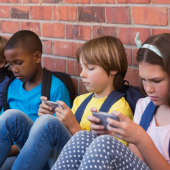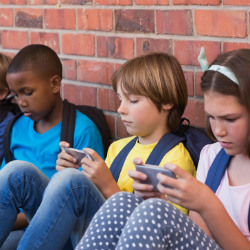 Back in the ’90s, children attempting suicide were a rare thing.
Back in the ’90s, children attempting suicide were a rare thing.
A child psychotherapist in the UK says she would typically see one or two attempts per year.
Now, she’s seeing as many as four a month – busier than she’s ever been in 25 years of practice, with her colleagues reporting that they’re similarly inundated.
The cause, she suggested, is children’s constant internet access.
Julie Lynn Evans has worked in hospitals, in schools and with families, and she told The Telegraph that the skyrocketing rates of mental health problems in youngsters correlates with access to gadgets:
Something is clearly happening, because I am seeing the evidence in the numbers of depressive, anorexic, cutting children who come to see me. And it always has something to do with the computer, the internet and the smartphone.
The newspaper reports that official figures back her up, with emergency admissions to child psychiatric wards having doubled over the past four years and self-harm hospitalisations in young adults up by 70% in a decade.
Evans said the turning point was in 2010:
I saw my work increase by a mad amount and so did others I work with. Suddenly everything got much more dangerous, much more immediate, much more painful.
What changed over the past 5 years is kids’ ownership of mobile phones – what she calls “pocket rockets” – which are now in the hands of over 80% of secondary school age children.
The idea that mobile phones can drive kids to suicide or other forms of self-abuse is simplistic, she admits, but it can’t be denied that life has changed because of them:
It's a simplistic view, but I think it is the ubiquity of broadband and smartphones that has changed the pace and the power and the drama of mental illness in young people.
One major change is that with our always-on culture, bullies can for the first time follow kids right into their bedrooms, keeping up a nonstop stream of cyber harassment, all done beyond adult supervision, she said.
It differs from the old days, when kids might well have had phones to stay in touch with parents, but those phones weren’t smart – rather, the devices were just dumb bricks.
Now, she said, young people can
access the internet without adult supervision in parks, on [the] street, wherever they are, and then they can go anywhere. So there are difficult chat rooms, self-harming websites, anorexia websites, pornography, and a whole invisible world of dark places. In real life, we travel with our children. When they are connected via their smartphone to the web, they usually travel alone.
Evans doesn’t believe in letting kids have mobile phones until they’re 14. She also believes in actively policing usage once they do get phones.
Of course, it’s an understatement to say that monitoring kids’ phone use won’t make parents popular.
One 12-year-old US girl last week admitted to poisoning her mother in retaliation for taking away an iPhone. Most kids don’t turn murderous over phone restriction, but such a discussion can still get tense.
There are many lists of tips for parents on how to negotiate device usage with children. Connect Safely, for one, advises parents to have a conversation – not give a lecture – about the use of a mobile phone.
The safety organisation suggests considering drawing up a family smartphone contract and talking with children about why each point is important.
As far as keeping your kids safe goes, Naked Security has some resources that we hope will help, including:
- A list of 7 apps and websites parents should be aware of;
- A guide to keeping your kids safe online with parental controls; and
- 10 tips to keep your kids and teens safe online.
As always, we are deeply grateful for additional tips and resources, as well as input from adults who care for children and young adults.
Please do add to the conversation in the comments section below.
Image of children using mobile phones courtesy of Shutterstock.

Anonymous
Correlation does not imply causation. Be careful attributing blame here.
Michael Theroux
There are plenty of anti-depressant and anti-psychotic pharmaceuticals that can help with this problem…oh, wait, these children are already on the pharmaceuticals? Hmmm…no correlation there I’m sure.
Guy
I am not writing to argue with the opinions in the article above. I would concede that there have been a number of real child suicide cases over the last few years, and that it is a trend that demands concern.
Nonetheless, I would suggest that other possible factors in the increase in referrals to mental health clinics in the UK could include cuts in funds to CAMHS (Child and Adolescent Mental Health Service) services in the NHS, leaving fewer child and adolescent psychiatrists, and fewer child physiologists available to see patients.
Also, I would suggest that over the past decade, the number of referrals could have risen as a result of greater recognition of mental health issues across the board, including in relation to children. Also, as teachers become more aware of what to look for, they may be willing to refer now, where in previous years they would not have.
It is possible that children in previous generations were equally unhappy, but where simply not offered the help that children are offered today.
It would be interesting to see statistics for the number of attempted suicides in the under 15 category over the last decade.
I agree cyber bullying is a problem and does demand our attention. It worth understanding exactly what the problem it presents is, though, if we are going to combat the real problem, and not just what we think it is.
Andrew Ludgate
I agree completely with what you’ve said. I wonder if a study back when kids were sent off to the bus stop to go to school would have turned up similar statistics on “children with more unsupervised time have more mental health issues.”
The reason I wonder this is that for the most part, the Internet and smart phones don’t seem to be the real issue; the issue appears to be children being exposed to a vast social network with no parental supervision. Smartphones are just today’s venue for expanding this unsupervised social setting.
In the article, Evans was careful not to find causation where she saw correlation; I think we need to do the same thing. Instead of looking at the technology, we should be looking at the issue (more unsupervised socializing correlates with increased reports of mental health issues in teenagers) and figure out how our old methods of creating safe social situations has broken down (children being allowed to do so unsupervised 24/7 with anyone in the world), and what can be done to fix this (always supervise/review phone/internet use, OR influence the social groups your children gravitate to, OR focus on improving self-esteem through positive social situations — if your children are busy socializing with a core group in a safe physical location, they’re not going to have as much time/desire to depend on unsafe social networks).
But I’m sure that we need a lot more research into the actual issues here — not much help to this decade’s teens, but we’ll likely figure out new methods of safe socialization eventually.
DavidTK
My 14 year old son has tried 3 times to kill himself. The Shit I found on his phone was unbelievably. The thinks that were being said to him on the phone by his (Friends) was truly evilly. His girl friend was pretending to be two other boys, and telling him what they were going to do to her. No one under the age of 17 should be able to have a smart phone!!!!!!!!!!!
My Son was on life-support for 7 days and is now on his 5th month in a behavioral center. We have no idea when he may come home.
When he comes home there will be no phone, internet, or Xbox live.
Parent controls do not work don’t waste your money, your kid know how to get around it. ( just Google it)
Remember this handing your kids a smart phone opens them up to every evilly person in the world!!!!!!!!! You might as well give them a loaded gun to play with. Have fun kids don’t be late dinner.
Lisa Vaas
DavidTK, my deepest sympathy. I pray your son manages to pull out of this.
anonymous
This is a no win situation. The biggest part of the problem here is parenting or lack there of. Most people with children just want to be their kids friend not a parent, and unfortunately the people that want to be parents are afraid to discipline their kids because the government says discipline is bad…..UmmK. If these people actually raised their kids with an ounce of self respect and a little back bone these things would be unheard of like they were when I was a kid. Kids are way too sensitive anymore because “everyone is special” and “everyone gets a trophy for showing up”. This has to lead to a pretty big disappointment when the kids finally realize that in real life they are not special and you don’t get a prize just for showing up.
OK Essay
Would the punk scene ever have happened if nobody was going to look at them? I can’t put my finger on why what I call ‘connectivity’ appears so dim witted and that is a problem. The masses seem to revel in playing whatever it is with their telephones and I leave them to it. I don’t feel smug about it. Just unconnected. Blissfully unconnected. Observing birds in real trees at the bus stop. The fish tank at the dentists. Old farty me at 45.